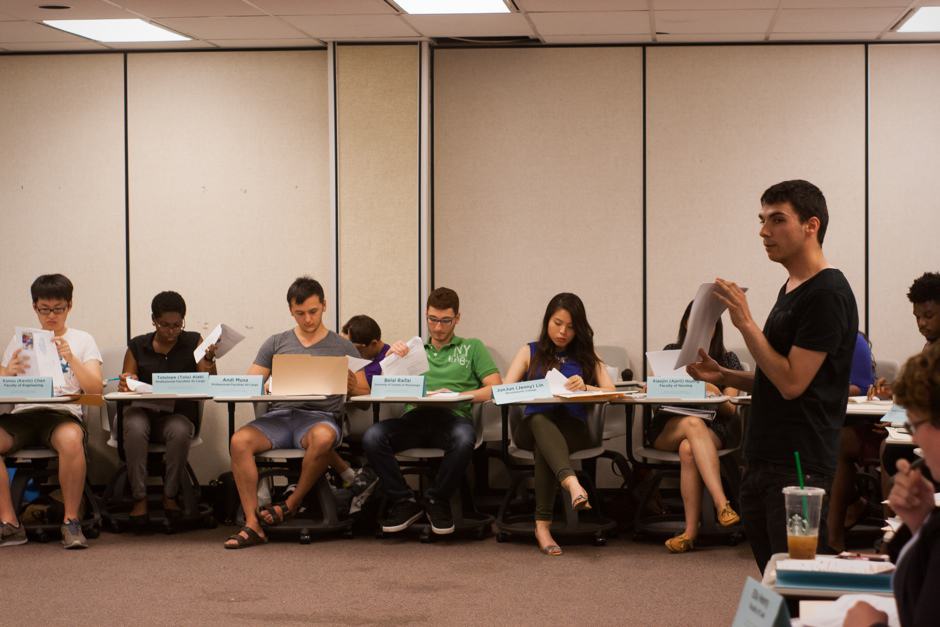On Friday, the University of Toronto Students’ Union (UTSU) board of directors passed a controversial motion on the continuance of federal incorporation in the face of changing legislation.
At present, the UTSU is federally incorporated under the Canada Corporations Act (CCA), legislation that is being dissolved in favour of the new Canada Not-for-profit Corporations Act (CNCA). As part of the transition from the CCA to the CNCA, the UTSU must replace its letters patent and bylaws with new charter documents.
The UTSU can then decide whether or not it will maintain its federal incorporation, or switch to provincial incorporation under the Ontario Not-For-Profit Corporations Act.
The motion asked that the board vote to continue federal incorporation under the CNCA, keeping the letters patent that established the existing structure of the organization.
The UTSU’s legal counsel, a representative from Davis LLP who was present at the meeting, described the motion as a “formality” and a “non-issue.”
The legal representative added that the vote served the purpose of staving off dissolution, rather than making any fundamental changes to UTSU bylaws or practices.
Pierre Harfouche, UTSU vice-president, university affairs, had expressed concern that under the letters patent as they were currently phrased, the character of the existing board would be changed without proper consultation from the student body.
Similar concerns were raised throughout the meeting, including concerns from some members of the board that the meeting was the first time they heard about the change.
Cameron Wathey, UTSU vice-president, internal and services, brushed off the concerns.
“We followed all procedures for this motion… If folks trusted the process and communicated with us, they may have realized that this motion was simply a formality,” he said.
After some discussion, Patrick Andison, Trinity College director, added an amendment to the motion, asking the UTSU to file the articles of continuance on October 16, thereby leaving as much time as possible for the union and its members to work out the layout of the board. The board voted overwhelmingly in favour of adding Andison’s amendment to the motion.
Andison added that a second, earlier UTSU Annual General Meeting (AGM) would likely be required to deal with the question of the new board structure. Bylaw changes surrounding that question must be ironed out before the UTSU decides to continue as a federally- or provincially-incorporated body.
The switch to provincial incorporation offers the UTSU close to three years for deliberation over board structure.
Discussion on the amended motion passed the hour-long mark when Najiba Ali Sardar, UTSU vice-president, equity, called for a vote to cut debate and head to a vote on the motion, a move that was widely approved by the board.
The amended motion was approved by a large majority, though some board members still expressed misgivings.
Harfouche abstained from a vote on the amended motion.
“I appreciated Patrick’s amendment for providing us with more time to achieve our goals of effective consultation and the formulation of a structure that is most representative of the will of our diverse membership,” said UTSU president Yolen Bollo-Kamara.
If no proposal for new bylaws is agreed upon by a two-thirds majority at the AGM, the UTSU would be considered non-compliant with the CNCA and would be open to an injunction that could lead to dissolution.
Trinity College Meeting chair Kaleem Hawa expressed concern with the transition process. “More likely than not … we will find ourselves in a stand-off where the only true winner is a student union who wishes to see our campus fragmented, disparate, and beholden to an identity-based polity that belies our unity,” he said.
However, Bollo-Kamara expressed confidence that the transition process would be smooth, adding that the USTU has already begun consultation with students over proposed bylaw changes that would affect board structure.
“I want to ensure that our members have sufficient context into the proposal already submitted, an understanding of legal constraints, and are aware of the process to submit their own proposals should they wish to do so. I’m looking forward to hearing more feedback and facilitating discussions as to how the UTSU can best represent our members,” she said.
The deadline for filing articles of continuance is October 17.


